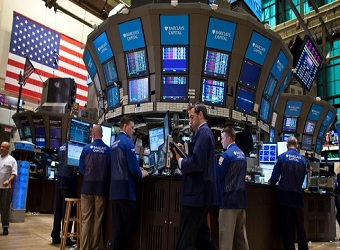The Dow Jones industrial average eked out a record close Thursday, erasing massive losses, as Wall Street bet on further gains from corporate earnings.
The 30-stock index finished 5.44 points higher at 23,163.04, while Travelers rose 2.4 percent and was the biggest contributor to the gains on the Dow. Travelers reported earnings per share that easily beat expectations.
The Dow had fallen 104.93 points at its session lows. Tech giant Apple saw its stock decline 2.5 percent, amid speculation of poor demand and cuts in production of iPhone 8. The stock was also posted its biggest one-day decline since Aug. 10.
The S&P 500 also erased its losses to manage a record close at 2,562.10, as a 12.2 percent gain in Adobe shares offset steep losses from United Continental. The airline’s stock fell 12.1 percent.
The Dow and the S&P 500 rose slightly into the close after Politico reported that President Donald Trump was leaning toward Federal Reserve Governor Jerome Powell to be the next head of the central bank. Appointing Powell as the Fed chair would represent a continuation of the central bank’s current regime.
The Nasdaq composite lagged, falling 0.3 percent to 6,605.07. Facebook, Google-parent Alphabet, Netflix and Amazon all finished lower.
Thursday also marked the 30th anniversary of “Black Monday,” the worst day in U.S. stock-market history. On that day, the S&P 500 plunged 20.5 percent and the Dow dropped 22.6 percent.
“You could make the argument that another major pullback like that could happen, but interest rates are not where they were then and inflation is still low,” said Peter Cardillo, chief market economist at First Standard Financial.
CFRA strategist Sam Stovall said in a note this week the S&P’s daily price chart this year looks “eerily” like that of 1987, but that’s about the only similarity between the market then and now.
Since the crash, the Dow has averaged a gain of 0.19 percent on Oct. 19 with positive returns two-thirds of the time, according to Bespoke Investment Group.
Thursday also marked the 30th anniversary of “Black Monday,” the worst day in U.S. stock-market history. On that day, the S&P 500 plunged 20.5 percent and the Dow dropped 22.6 percent.
“You could make the argument that another major pullback like that could happen, but interest rates are not where they were then and inflation is still low,” said Peter Cardillo, chief market economist at First Standard Financial.
CFRA strategist Sam Stovall said in a note this week the S&P’s daily price chart this year looks “eerily” like that of 1987, but that’s about the only similarity between the market then and now.
Since the crash, the Dow has averaged a gain of 0.19 percent on Oct. 19 with positive returns two-thirds of the time, according to Bespoke Investment Group.
Source: CNBC & Reuters


